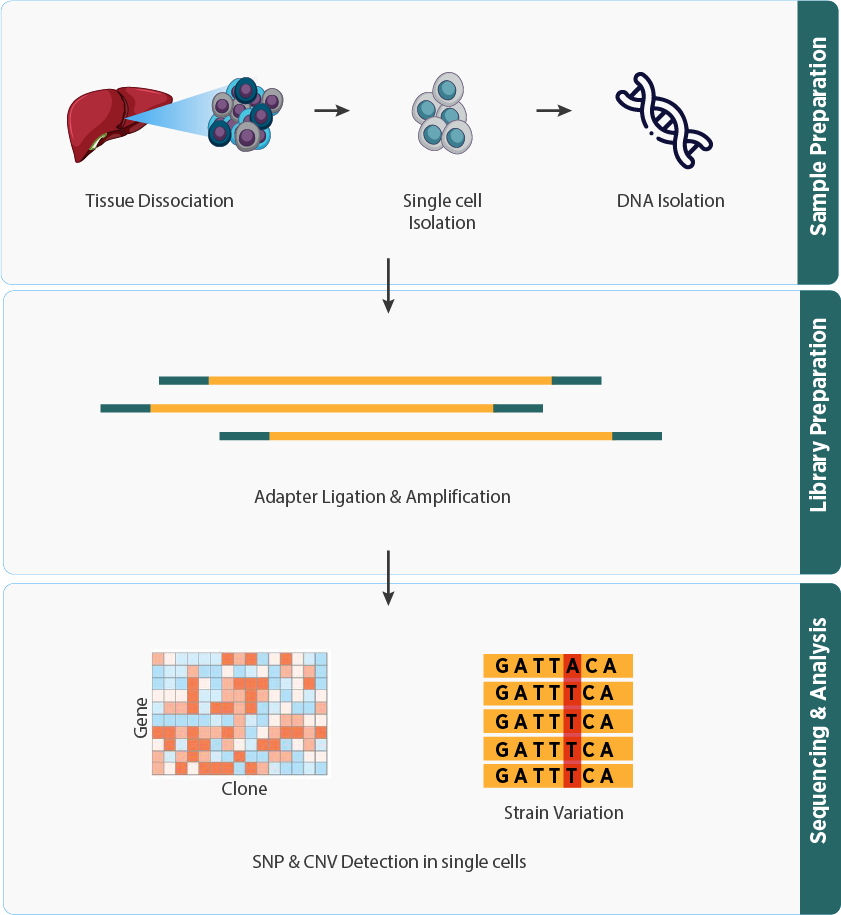Introduction and Workflow
- Single Cell DNA Sequencing analyzes genetic material from individual cells, revealing unique genomic insights that bulk sequencing methods often obscure.
- The workflow begins with cell partitioning facilitated by the 10X Chromium system, employing gel beads and oil-surfactant solutions. Each droplet encapsulates a solitary cell uniquely tagged with a barcode.
- Within these partitions, DNA amplification yields amplified DNA fragments from each cell. Subsequently, barcoded samples combine for library preparation, where DNA fragments undergo adapter ligation to facilitate sequencing.
- During sequencing, the barcode identifiers enable precise tracking of data to its specific cell or nucleus of origin, thereby providing comprehensive genetic insights for individual cells.
- This technique enables researchers to unravel unique genetic characteristics and variations present within individual cells, providing unprecedented insights into cellular diversity and function.
Advantage
- DNA exhibits greater stability compared to RNA, ensuring ample time for sample processing without degradation.
- Capable of detecting rare mutation-bearing cell clones with sensitivity levels as low as 0.1%, enabling direct analysis of rare cell types or primary cells even with limited samples.
- Reveals the diversity of genetic profiles within cell populations, aiding in the study of complex biological processes and enabling precise profiling of subpopulations like cancer cell evolution or DNA copy number variations in neurons.
- Allows for the tracking of genetic changes over time within individual cells, crucial for understanding disease progression and evolution.

Bioinformatics Pipeline

Applications of Single Cell DNA Sequencing
- Cancer Genomics- Detects genetic mutations and variations in individual cancer cells, revealing tumor heterogeneity, identifying subclonal populations, and guiding personalized treatment strategies based on specific genetic alterations.
- Developmental Biology- Studies genetic variations and mutations in single cells during development, providing insights into cell lineage, differentiation, and the genetic basis of developmental disorders.
- Stem Cell Research- Analyzes genetic profiles of individual stem cells to understand their potential for differentiation, track mutations during cell division, and improve stem cell therapies.
- Rare Disease Research- Identifies genetic variants in single cells from patients with rare diseases, aiding in the discovery of novel disease-associated mutations and improving diagnostic precision.
- Population Genetics- Examines genetic diversity at the single-cell level within populations to understand evolutionary processes, genetic variation, and adaptation mechanisms, offering a more detailed view of population genetics compared to bulk analysis.
Service Specifications
Sample Requirement
96-well plates of live cells suspension, Frozen cells in specific frozen lysates, Genomic DNA, and Other samples.
Please refer to sample submission guidelines or Contact Us!
Sequencing Platform
10X Genomics Chromium System followed by Illumina Sequencer

Deliverables
- The original sequencing data
- Experimental results
- Bioinformatics and Data Analysis Report
- Details of Single Cell DNA Sequencing (customizable)
